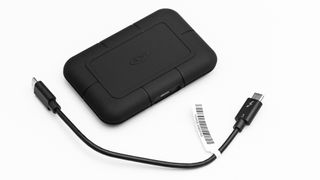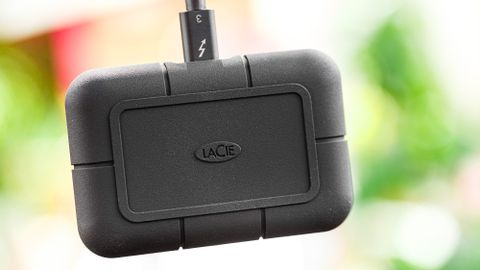Why you can trust Tom's Hardware
Comparison Products
To challenge the Rugged SSD Pro in today’s review, we threw in a few of the fastest portable SSDs we’ve tested as well as some cheaper alternatives. We include the Samsung X5 and G-Technology G-Drive mobile Pro as the Thunderbolt 3 powered competitors. With their high-performance and high cost, they compete directly with the LaCie.
SanDisk’s Extreme Pro and LaCie’s Rugged SSD are two other high-end alternatives, but are shackled down by a USB 10 Gbps connection. The Adata SE800 is a more affordable USB 10 Gbps SSD, but underperforms the two in most circumstances. We also included SanDisk’s Extreme, a SATA-based portable SSD and LaCie’s Mobile Drive, a portable HDD, for added perspective.

Transfer Rates – DiskBench
DiskBench is a storage benchmarking tool that allows us to test the transfer or copy performance of a storage device with real data. We test external drives with three file transfers that consist of 25GB of photos (10GB of jpgs and 15GB of RAW photos), 50GB of movies, and 25GB of documents. First, we transfer each folder from a 1TB NVMe SSD to the external device; then we follow up by reading a 3.7GB 7-zip file and a 15GB movie back from the device.










Looking at the rankings, LaCie’s Rugged SSD Pro does well to outperform its 10 Gbps competition and proves it can absorb our test files quickly, but it doesn’t perform as well when writing the large media file folders as it does with small files. All the Thunderbolt 3-powered SSDs offer much faster read performance. G-Technology’s G-Drive mobile Pro and Samsung’s X5 both offer faster media file writing performance than the LaCie, but only the X5 is more responsive during the 25GB document files transfer. G-Technology falls behind here because of the internal WD Black SN750 NVMe SSD powering it has slightly higher-than-average small file random latency.
Trace Testing - PCMark 10 Storage Test: Data Drive Benchmark
PCMark 10 is a trace-based benchmark that uses a wide-ranging set of real-world traces from popular applications and common tasks to measure the performance of storage devices. To test drives that store files rather than applications, we utilize the Data Drive Benchmark.



When it comes to PCMark 10’s latest storage tests, LaCie’s Rugged SSD Pro takes the crown as the most-responsive SSD in the bunch by a significant margin. It is over twice as fast as the Samsung X5 and G-Technology G-Drive mobile Pro SSDs in this workload. The 10 Gbps competition proves capable, and LaCie’s Rugged SSD is one of the fastest we have tested yet, but with the slower interface holding these drives back, they can’t match the capability of faster Thunderbolt 3 devices. Relative to the HDD, LaCie’s Rugged SSD Pro offers a dramatic upgrade in performance.
Synthetics - ATTO
ATTO is a simple and free application that SSD vendors commonly use to assign sequential performance specifications to their products. It also gives us insight into how the device handles different file sizes.


In ATTO, we tested LaCie’s Rugged SSD Pro at a QD of 1, representing most day-to-day file access at various block sizes. Its sequential performance is very good as a Thunderbolt 3 portable SSD, with performance peaking at 2,450/2,130 MBps read/write. The LaCie’s performance is nearly on par with the Samsung X5 across the board, but is significantly faster than G-Technology’s G-Drive mobile Pro at smaller file sizes. The G-Technology, however, displays faster write performance at larger file sizes, which aided it in our media file transfer testing.
Synthetics - iometer
iometer is an advanced and highly configurable storage benchmarking tool that vendors often use to measure the performance of their devices.








Our iometer testing reveals the peak performance of the LaCie Rugged SSD Pro. Sequential performance peaks at 2.8/2.4GBps read/write, placing it in third place overall. The other Thunderbolt 3 devices, again, show slightly better write performance. With random read and write latency measured at 0.092 / 0.032 ms at QD1 and peak random performance hitting upwards of 480,000 / 340,000 IOPS read and write, LaCie’s Rugged SSD Pro proves to be quite responsive.
Sustained Write Performance, Cache Recovery and Temperature
Write speed and temperature are two important and inter-related metrics for external devices. We threw in this one last test to measure the performance of the drive over a 15-minute window, writing to the full span of the drive. This test reveals if the drive has a pseudo-SLC cache, which is a small portion of faster-programmed flash that absorbs incoming write workloads. We also monitor cache recovery via multiple idle rounds.
When possible, we also log the temperature of the drive via the S.M.A.R.T. data to see when (or if) thermal throttling kicks in and how it impacts performance. Bear in mind that results will vary based on the workload and ambient air temperature.





LaCie’s Rugged SSD Pro features an SSD that has an SLC write cache. After writing about 25GB of data to the SSD, write speeds degraded from an average of about 2.1 GBps down to about half that, 1.1 GBps. While this is something we don’t like to see from professional devices, especially ones this expensive, the base write speed is still very respectable once the cache fills. And the drive recovers very quickly too. Just wait 30 seconds to a minute and it can write at full speed once again. Plus, unlike the Samsung X5, the LaCie Rugged SSD Pro doesn’t get too hot and throttle under heavy use. LaCie’s portable SSD remained well within its rated temperature operating limits.
MORE: Best SSDs
MORE: How We Test HDDs And SSDs
MORE: All SSD Content

Sean is a Contributing Editor at Tom’s Hardware US, covering storage hardware.
